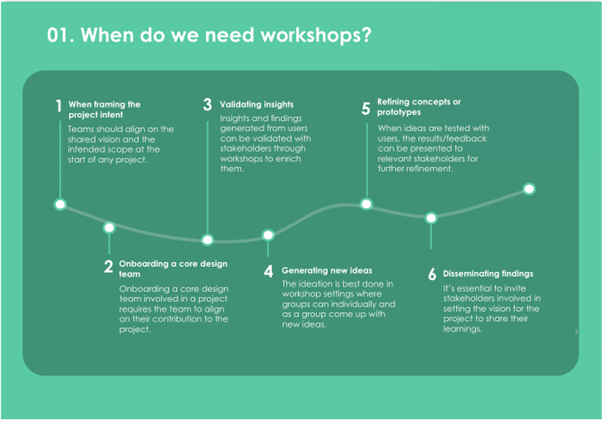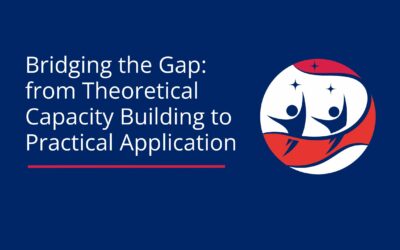Purpose
A practical and interactive skills-building session that highlighted workshops as a key tool used in HCD.
- We explored different kinds of workshops and their uses in the HCD process
- Learnt best practices
- Understood how these skills, tools and resources can be used to further enrich ASRH programming.
 Presenters
Presenters

Why use HCD workshops?
Workshops can be used to achieve different objectives throughout the different stages of the HCD process.
- Project start up: project and design teams can come together in a workshop to frame the intent and clarify the intended scope of the project or define who the stakeholders are and what success looks like for each of these stakeholders.
- Validating insights or findings from HCD research with your participants and other project stakeholders such as project teams, government or other partners.
- Ideating to generate ideas on possible solutions
- Refining prototypes to problems
- Project closure reflections: project implementation process, the lessons learned and how well the project met its vision or outcomes.
Key Terms & Definitions
Human-centered design
Human-centered design is the process of integrating human perspectives in all steps of the problem-solving process. The aim is to better understand an issue from the human perspective and focus on how it looks and feels to users within their environment and context.
HCD Process
HCD operationalizes its principles in a process that includes four main phases: inspiration, ideation, prototyping (or testing) and implementation.
HCD Principles
HCD is based on four fundamental principles: identify the ‘real/underlying’ problem; being people-centered; employ activity based discovery; and iterate, test, and refine proposed solutions rapidly.

“Workshops should be energetic and leave [their] members empowered, informed, and inspired. This relies very heavily on the style of facilitation. For this reason, a collaborative, creative mindset is core for a successful ideation session. These qualities must be embodied by the facilitator to lead by example.” – Catherine Wanja Gitau
Which workshops to use throughout the HCD phases?
Different workshops provide optimum results in the different phases of the HCD process.
1. Intent and Validation workshops
- The intent workshop defines the project goals and research questions.
- The validation workshop comes after gathering insights from users. The goal of the validation workshop is to validate that, indeed, the problem, as pointed out by users, resonates with other users and even with partners and experts who have worked in these communities.
2. Ideation workshops
- In this phase, insights are turned into opportunity areas for solution generation. An ideation workshop (also called co-design or co-creation) allows the teams and users to:
- Ask the right questions and innovate with a strong focus on your users, their needs, and your insights about them
- Step beyond the obvious solutions and therefore increase the innovation potential of your solution
- Bring together perspectives and strengths of your team members
- Create volume and variety in your innovation options.
3. Prioritization workshops
- Practitioners conduct prioritization workshops to make decisions on which prototypes to refine further for testing.
- These usually occur at the prototyping phase of the HCD process.
4. Prototype redesign workshops
- At this stage, practitioners can hold prototype redesign workshops to evaluate the testing results and learnings.
- During this step, teams make crucial decisions on what to keep, what to merge, and what to discard.
5. Dissemination workshops
- During this step, teams can conduct dissemination workshops to share learnings from the prototyping process and final interventions that proceed to scale.
- These workshops provide a good opportunity to share best practices with a wide group of partners and, most importantly, to reflect on results expected from the scale-up of projects.
Who should be involved in your workshops?
Our experts showcased their “model of four voices” which guides them in determining which stakeholders need to be included, for example in an ideation workshop.
- Voice of intent – who is pushing for this change? Who has the power to deliver it?
- Voice of expertise – who has the technical know-how?
- Voice of experience – is the person who will use or navigate this system. How will it impact their lives?
- Voice of design – a designer’s job is to broker all the voices (see above) and facilitate a dialectic process that leads to synthesis. And then to do it all over again until a final product or service is ready to go out into the world.
“Ideation workshops are the bridge between the empathy phase (diverge) and the concept/prototype development phase (converge). To transition between the two you need ideas that will inspire the final designs that you eventually create.” – Oliver Muchiri
Top Tips
- Clearly communicate objectives
- Create a ‘pledge’ with participants
- Give straightforward instructions
- Quantity is more important than quality when coming up with ideas
- Make your ideas clear and simple
Core Principles of how to run an ideation workshop
- Clear intent: is key to ensuring that each participant understands the end goal and their contribution to the realization of that goal
- Nurture a collaborative approach: This type of workshop brings together very diverse groups of people and it is important to ensure that this group collaborates with each other.
- Understand power dynamics and create the safe spaces where participants can be open and honest, including considering if separate workshops are needed.
- Create space for innovative ideas: Remember to accommodate divergent thinking and wild exploration before you can start to converge on a few ideas.
- As you narrow down on the top ideas, optimize desirability, feasibility, and viability
- Be agile and adapt on the go: When preparing for a workshop, we often make a lot of assumptions about how everything will run. It is important to adapt when these assumptions are challenged or proved wrong.
The journey of an ideation workshop
1
STEP 1 = PREPARATION
- Workshop agenda development
- Identifying the right participants,
- Developing materials (such as concept development sheets)
- Identifying a facilitator to guide the conversations to the intended income.
2
STEP TWO = EXECUTION
- This is the most critical step as it entails walking with users to develop ideas and solutions.
- This step requires a lot of creativity and inspiration and atmosphere that is ripe for creativity.
- You can do this using a creative activity or videos.
- Managing group dynamics is a critical part of facilitating ideation workshops. is crucial that all participants feel empowered to share their ideas freely.
3
STEP THREE = POST-WORKSHOP
- Here the core team involved in organizing the workshop should come together to synthesize the outcomes of the workshop.
- Ideas are refined and testing plans are developed for the concepts.
Useful Links
- Check out the workshop slidedeck for more tips
- Check out our Forum for discussions on this topic
- Watch the live webinar recording here
- Read our HCD in a Nutshell infographic for a high level overview of the principles, mindsets and tools.




